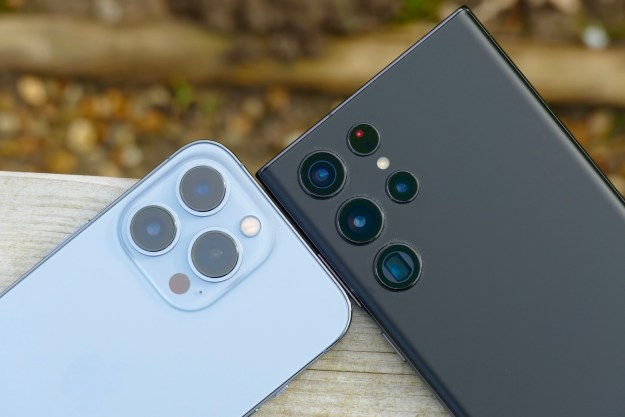There are countless apps out there designed to help you learn a new language, which makes it tricky to pick the right one. You may want to widen your vocabulary, get some conversation practice in, revise your grammar, or all of the above. Whatever your goal, there’s likely an Android or iOS app for you. Below are a few of our current favorites, so you can pick up a foreign tongue without ever stepping foot inside a classroom.
If you’re planning a trip elsewhere, then you may also be interested in our picks for the best travel accessories and the best travel adapters.
Duolingo
There are plenty of reasons why Duolingo is one of the most popular language apps around — it’s free, well-designed, and accessible. Lessons are broken down into bite-sized chunks and it feels like you’re playing a game.
The app divides languages into different topics, such as clothing or business, but also into adverbs, pronouns, and other grammatical subjects. You must interpret the text and audio, but you can slow down the audio if you’re having trouble understanding it. The app’s answering structure encompasses a wide range of activities, too, meaning you’ll often switch between typing answers, speaking them aloud, and choosing from a set of multiple choice answers.
Duolingo is a great introduction, but it can feel like you’re learning a random mix of information, often through repetition. Obviously, the more you do, the more robust your vocabulary will be. It’s great for comprehension purposes, yes, but it may not be the best when it comes to developing your conversational skills. The offline mode is limited, too, so you really need a Wi-Fi or data connection to make the most of Duolingo, or you can upgrade to Plus from $7 a month to access courses offline, unlock progress quizzes, and enjoy the app ad-free.
Supported languages: Over 35 languages, including English, Spanish, French, German, Italian, Portuguese, Dutch, Irish, Danish, Swedish, Russian, Ukrainian, Esperanto, Polish, and Turkish.
Mondly
With over 50 million downloads, Mondly won Apple’s award for Best New App in 2016, and it’s only gotten better since then. It’s easy to use, and designed to get you speaking fluently, fast. Unlike most other language learning apps, Mondly lets you learn in your native language, great for non-native English speakers.
The app’s colorful design and engaging content make it fun to learn, with in-depth lessons on over 20 topics for beginners, intermediate, and advanced learners. The emphasis here is on learning a language in a real-life context, and there’s a chatbot with speech recognition so you can practice your conversational skills. Mondly even has a competition board to track your progress and a variety of games, quizzes, and activities to help you consolidate your learning
You’ll get access to the first section of six lessons, one conversation, and one vocabulary section (including chatbot conversations) for free, including one new lesson a day, weekly quizzes, and monthly challenges to test your progress – but you can only learn one language at a time. To subscribe and unlock all languages and features will cost you from $10 a month or $48 a year.
Supported languages: Spanish, English, French, German, Portuguese, Italian, Russian, Norwegian, Danish, Swedish, Korean, Japanese, Chinese, Greek, Romanian, Vietnamese, Indonesian, Hindi, Hebrew, Polish, Bulgarian, Ukrainian, Czech, Croatian, Finnish, Persian (Farsi), Afrikaans, and Turkish.
Babbel
This app is broken down into lessons that last between 10 and 15 minutes each. There are packs of lessons that cover different abilities, including those tailored to both beginners and advanced learners. The app teaches you a range of words and phrases, and challenges you to spell them out, speak them aloud, and fit them into sentences.
A nice thing about Babbel is that it focuses on conversational learning and it explains grammar rules as you progress. Filling in the gaps in mock conversations is fun and the lessons progress in a logical, traditional manner, starting with basic conversational phrases that you’ll want to master. You can also download lessons to work through while you’re offline.
The app design is a bit rough around the edges and we found that the software’s voice recognition doesn’t always work the way it’s intended to. Also, though you get one lesson for free with Babbel, you have to pay from $7 a month if you want full access to the learning materials for a single language.
Supported languages: English, Spanish, French, German, Italian, Brazilian Portuguese, Russian, Turkish, Polish, Indonesian, Dutch, Danish, Swedish, and Norwegian.
Tandem
Everyone knows that the only way to become fluent in a new language is to speak it. Thankfully, Tandem is geared toward conversations with native speakers. The idea is that you can help one another learn new languages via text, audio, and video chat. The app vets you and then helps you to find a partner who shares your interests. They teach you and you teach them.
Once you agree on a time to chat, you can pick specific topics that serve as conversation prompts, which helps ease the initial awkwardness of talking to a stranger. It’s free if you can find a suitable exchange partner, which is easy for popular languages. You can also pay for a lesson with a professional tutor, if need be. It’s worth noting that while most functionality is free, to search for members by city or find those near you, you’ll want to upgrade to Pro, from $7 a month.
To sign up, you’ll need to use your Facebook or Google account. There are also moderator checks to ensure that you’re serious about learning, and to weed out those who are abusing the service. This means you might have to wait for your profile to be approved. If you’re ready to move onto the next level with your language and want to speak to a native, then Tandem is worth checking out.
Supported languages: English, Spanish, French, German, Portuguese, Italian, Chinese, Japanese, Russian, and nearly 150 other languages.
Memrise
If you want to practice and expand your vocabulary, then Memrise is a fun way to do it. The app is set up like a game, one in which you travel to a foreign planet as a spy and you score points for correct answers. It’s a unique way to frame language lessons, and the bulk of the courses consist of memorizing specific words and phrases using mems, which are strange sentences or images.
You can also listen to audio recordings of various words and phrases, and occasionally see video footage of native speakers saying them. The general idea is to learn words and then review them at predetermined intervals, which grow longer as you memorize the words. There’s some science behind the algorithm, but it ultimately amounts to a sophisticated flashcard system. Still, it seems to be very effective for some people.
Memrise primarily functions as a vocabulary builder, so you’ll want to combine it with conversation and grammar lessons, if possible. Some of the mems are odd, but bizarre associations and images can be a very effective way to memorize things. You can sign up for the app via email, or use your Google or Facebook account, which grants you access to the wealth of community-created content.
The app’s basic functionality is free, but a subscription ($9 a month) will grant you access to additional games and an offline mode.
Supported languages: French, Spanish, German, English, Chinese, Japanese, Korean, Turkish, Russian, Italian, Portuguese, and more than 100 other languages.
Busuu
With an impressive user base of more than 60 million people, Busuu is worth checking out. It’s a well-designed app that offers about a thousand complete lesson packages, all of which are created by linguistic experts and span an impressive amount of content. The app provides you with essential flashcards, along with grammar, writing, dialogue, and pronunciation exercises. The quizzes and vocabulary games are also quite fun for testing your knowledge, and they keep you easily engaged while you learn.
Busuu also offers a set of handy travel courses that provide the basics for a particular language, allowing you to better prepare for your next trip and interact with the locals. You can even chat with native speakers — and have them correct your text — or earn points by correcting other learners. There’s an offline mode, too, so you can download lessons and study without an internet connection — perfect for on-the-go learning.
Busuu gives you writing exercises and essential flashcards, but to get the full experience of courses and bonus tools, you need to subscribe. A subscription costs between $6 and $10 monthly. One outstanding feature of Busuu is the robust community of both native speakers and fellow language learners. It’s simple to find your fit regardless of your chosen language, whether it’s Russian, Arabic, or expanding your Spanish skills. You get control over how you study your new language, whether you prefer learning on a desktop or laptop, or even on the Busuu mobile app on the go.
Supported languages: Spanish, English, German, French, Italian, Portuguese, Turkish, Arabic, Polish, Russian, Chinese, and Japanese.
Beelinguapp
We know this can seem like an impossible task, but reading is one of the best ways to immerse yourself in a foreign language. Reading goes beyond just teaching you words and grammar by keeping you involved and prompting comprehension skills to kick in. Beelinguapp delivers on this front; The app features a fun reading style to help users learn a foreign language.
After installing the app, you can choose between nearly a dozen languages commonly spoken around the world. You can also customize your skill level by selecting either beginner, intermediate, or advanced—label whether you prefer fiction or nonfiction readings. Finally, the app will compile your preferences and provide several messages, text, and song lyrics in both your native language and the language you’re attempting to learn.
If you want, you can opt to have the books and text read aloud by a native speaker in your desired language. This feature helps clear up confusion about pronunciation and improve your listening skills. Overall, the app works to sharpen your reading, listening, and speaking skills simultaneously– the only thing it’s missing is writing skills.
Beelinguapp is free, but if you hand over the $5 fee, you can get the app ad-free. If you subscribe, you’ll also have access to the full catalog of stories to download and read.
Editors' Recommendations
- The best tablets in 2024: top 11 tablets you can buy now
- Best refurbished iPhone deals: Get an iPhone 14 for $513
- The 6 best tablets for kids in 2024
- 10 iPhone productivity apps you need to download right now
- Best iPhone 15 deals: How to get Apple’s latest iPhone for free

























